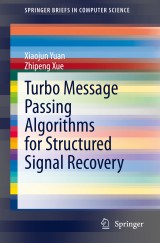Details

Turbo Message Passing Algorithms for Structured Signal Recovery
SpringerBriefs in Computer Science
|
64,19 € |
|
| Verlag: | Springer |
| Format: | |
| Veröffentl.: | 13.10.2020 |
| ISBN/EAN: | 9783030547622 |
| Sprache: | englisch |
Dieses eBook enthält ein Wasserzeichen.
Beschreibungen
<p>This book takes a comprehensive study on turbo message passing algorithms for structured signal recovery, where the considered structured signals include 1) a sparse vector/matrix (which corresponds to the compressed sensing (CS) problem), 2) a low-rank matrix (which corresponds to the affine rank minimization (ARM) problem), 3) a mixture of a sparse matrix and a low-rank matrix (which corresponds to the robust principal component analysis (RPCA) problem). The book is divided into three parts. First, the authors introduce a turbo message passing algorithm termed denoising-based Turbo-CS (D-Turbo-CS). Second, the authors introduce a turbo message passing (TMP) algorithm for solving the ARM problem. Third, the authors introduce a TMP algorithm for solving the RPCA problem which aims to recover a low-rank matrix and a sparse matrix from their compressed mixture. With this book, we wish to spur new researches on applying message passing to various inference problems. </p><p></p><p></p><p></p><p></p><ul><li>Provides an in depth look into turbo message passing algorithms for structured signal recovery</li><li>Includes efficient iterative algorithmic solutions for inference, optimization, and satisfaction problems through message passing</li><li>Shows applications in areas such as wireless communications and computer vision</li></ul><p></p>
<p>Introduction.- Turbo Message Passing for Compressed Sensing.- Turbo Message Passing for Affine Rank Minimization.- Turbo Message Passing for Compressed Robust Principal Component Analysis.- Learned Turbo Message Passing Algorithms.- Future Research Directions.- Conclusion.</p>
<p> Dr. Xiaojun Yuan received the Ph.D. degree in Electrical Engineering from the City University of Hong Kong in 2008. From 2009 to 2011, he was a research fellow at the Department of Electronic Engineering, the City University of Hong Kong. He was also a visiting scholar at the Department of Electrical Engineering, the University of Hawaii at Manoa in spring and summer 2009, as well as in the same period of 2010. From 2011 to 2014, he was a research assistant professor with the Institute of Network Coding, The Chinese University of Hong Kong. From 2014 to 2017, he was an assistant professor with the School of Information Science and Technology, ShanghaiTech University. He is now a professor with the Center for Intelligent Networking and Communications (CINC), the University of Electronic Science and Technology of China. His research interests cover a broad range of wireless communications, statistical signal processing, and information theory including multi-antenna techniques, network coding, cooperative communications, compressed sensing, etc. He has published over 160 peer reviewed research papers in the leading international journals and conferences, and has served on a number of technical programs for international conferences. He is now serving as an editor of IEEE Transactions on Wireless Communications, as well as of IEEE Transactions on Communications. He was a co-recipient of a number of Best Paper Awards of IEEE journals and conferences.</p><p> Zhipeng Xue received the B.E. degree in communication engineering from Southwest Jiaotong University, China, in 2015. He is currently pursuing the Ph.D. degree at ShanghaiTech University, in the School of Information Science and Technology. His research interests include statistical signal processing and machine learning.</p><p> </p><p> <br> </p><p></p>
<p>This book takes a comprehensive study on turbo message passing algorithms for structured signal recovery, where the considered structured signals include 1) a sparse vector/matrix (which corresponds to the compressed sensing (CS) problem), 2) a low-rank matrix (which corresponds to the affine rank minimization (ARM) problem), 3) a mixture of a sparse matrix and a low-rank matrix (which corresponds to the robust principal component analysis (RPCA) problem). The book is divided into three parts. First, the authors introduce a turbo message passing algorithm termed denoising-based Turbo-CS (D-Turbo-CS). Second, the authors introduce a turbo message passing (TMP) algorithm for solving the ARM problem. Third, the authors introduce a TMP algorithm for solving the RPCA problem which aims to recover a low-rank matrix and a sparse matrix from their compressed mixture. With this book, we wish to spur new researches on applying message passing to various inference problems. </p><p></p><ul><li>Provides an in depth look into turbo message passing algorithms for structured signal recovery</li><li>Includes efficient iterative algorithmic solutions for inference, optimization, and satisfaction problems through message passing</li><li>Shows applications in areas such as wireless communications and computer vision</li></ul><p></p><p> </p>
Provides an in depth look into turbo message passing algorithms for structured signal recovery Includes efficient iterative algorithmic solutions for inference, optimization, and satisfaction problems through message passing Shows applications in areas such as wireless communications and computer vision
Diese Produkte könnten Sie auch interessieren:

High-Frequency Oscillator Design for Integrated Transceivers

von: J. van der Tang, Dieter Kasperkovitz, Arthur H.M. van Roermund

149,79 €















